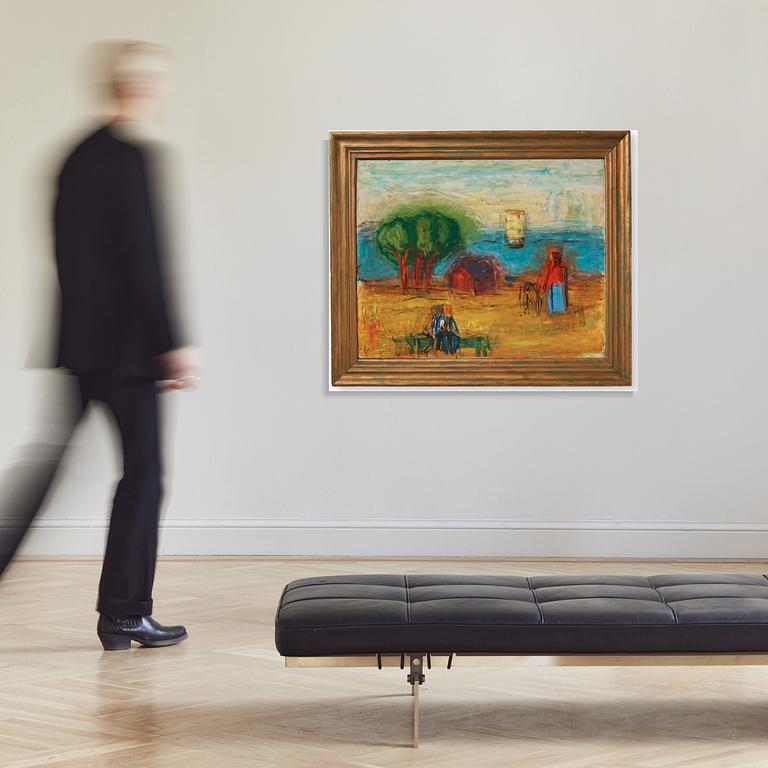Carl Kylberg
"På stranden, Kylbergshus" / "Le Rivage"
Signed CK. Also Carl Kylberg verso. Executed 1940. Canvas 92 x 114 cm. Frame by the artist's wife Ruth, 114 x 134 cm.
Alkuperä - Provenienssi
Prof. John Hellström, Stockholm.
Bukowski Auktioner, Stockholm, Moderna Höstauktionen 1986, auction 447, cat. no. 14.
Private collection.
Näyttelyt
Liljevalchs Konsthall, Stockholm, "Carl Kylberg", 20 April - 12 May, 1946, cat. no. 76. Musée National d'Art Moderne, Paris, October - November, 1951, cat. no. 55.
Paderborn, Tyskland, ”Carl Kylberg 1878-1952”, November 1966 in collaboration with Svensk-Franska Konstgalleriet, cat. no. 29.
Stadsmuseet i Eindhoven, Holland, 1967, cat. no. 29.
Kirjallisuus
Brita Knyphausen, "Carl Kylberg", listed as no. 296 "Stranden", illustrated p. 121.
Muut tiedot
Carl Kylberg sought expression for the spiritual, universal, and common human experience in his paintings. This "search" also evoked a strong sense of timelessness in his works. Kylberg was preoccupied with philosophical thoughts about human existence, life, and journey on earth, and he never aimed for naturalistic interpretations but rather saw it as his task to become an interpreter of the deeper underlying reality. He wanted to convince people that their soul's eyes could also see. By painting dry-on-dry, Kylberg creates a suggestive feeling that draws the viewer's gaze towards infinity. As often in Carl Kylberg's artistry, the time depicted is taken from the slowly emerging transition between night and day. The auction's work "På stranden, Kylbergshus" is executed in a technique and color characteristic of Kylberg, where he creates a feeling that the motif and thus the colors vibrate. The artworks created in the late 1930s and early 1940s are undoubtedly among the most interesting and accomplished that Carl Kylberg created. During this period, one is overwhelmed by excited color meetings, with sparkling coloristic exuberance where the motifs emerge from clouds of color. The tension between the timeless cosmic and the momentary impression of the nearby is felt throughout Kylberg's production, perhaps most clearly in his landscapes, where there is a more vital element of something elemental earthy. The contact with nature, the drawing, the form, and the composition are essential in his works. Often, the classical feature is also felt under the layers of color, as he distributes the image elements and incorporates them into a picture architecture. A fundamental structure, built of horizontals and verticals, creates well-disposed scenes related to those encountered by classicists such as Poussin and Cézanne. In the auction's painting " På stranden, Kylbergshus" executed in 1940, the viewer encounters a brilliant example of Kylberg's ability to highlight and enhance nature's own colors. The warm palette is painted with sweeping brushstrokes, and the contours are, according to Kylberg's characteristic, blurred, but they interact rather than merge.
















































































